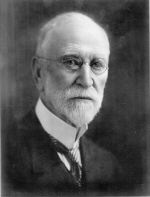Norton Parker Chipman (March 7, 1836 - February 1, 1924)
Presiding Justice, April 1905 - May 1921
 Born March 7, 1836, at Milford Center, Ohio, Norton Parker Chipman was educated at Washington College and Cincinnati, Ohio, Law School (1859). After admission to the bar of Iowa in 1859, he practiced law there until the outbreak of the Civil War in 1861, when he enlisted in Company "H", Iowa Infantry. Chipman was seriously injured and reported as dead at Fort Donelson in 1862, but he did, in fact, survive. After he recuperated, he was assigned to special duty in Washington, and was on Lincoln's staff at Gettysburg. As judge advocate, Chipman prosecuted Captain Wirtz, commander of the heinous Andersonville Prison. Chipman's account of the trial was published in 1911 under the title "The Tragedy of Andersonville." After the war, President Grant appointed Chipman Secretary of the District of Columbia; he was later elected to Congress from that district in 1871, and served two terms. He was one of the founders of the Grand Army of the Republic, and authored the order creating Memorial Day. In 1876, Chipman moved to Red Bluff, California, where he practiced law, farmed, and for 15 years served on the State Board of Trade. In 1897, he was appointed Commissioner of the Supreme Court, a position he held until the commission was disbanded and replaced by the District Courts of Appeal. He was appointed by Governor Pardee to serve as presiding justice of the newly created appellate court, a position he held until his retirement May 2, 1921. Justice Chipman died in his home in San Francisco, February 1, 1924.
Born March 7, 1836, at Milford Center, Ohio, Norton Parker Chipman was educated at Washington College and Cincinnati, Ohio, Law School (1859). After admission to the bar of Iowa in 1859, he practiced law there until the outbreak of the Civil War in 1861, when he enlisted in Company "H", Iowa Infantry. Chipman was seriously injured and reported as dead at Fort Donelson in 1862, but he did, in fact, survive. After he recuperated, he was assigned to special duty in Washington, and was on Lincoln's staff at Gettysburg. As judge advocate, Chipman prosecuted Captain Wirtz, commander of the heinous Andersonville Prison. Chipman's account of the trial was published in 1911 under the title "The Tragedy of Andersonville." After the war, President Grant appointed Chipman Secretary of the District of Columbia; he was later elected to Congress from that district in 1871, and served two terms. He was one of the founders of the Grand Army of the Republic, and authored the order creating Memorial Day. In 1876, Chipman moved to Red Bluff, California, where he practiced law, farmed, and for 15 years served on the State Board of Trade. In 1897, he was appointed Commissioner of the Supreme Court, a position he held until the commission was disbanded and replaced by the District Courts of Appeal. He was appointed by Governor Pardee to serve as presiding justice of the newly created appellate court, a position he held until his retirement May 2, 1921. Justice Chipman died in his home in San Francisco, February 1, 1924.
